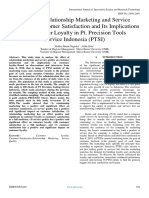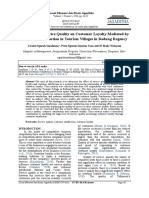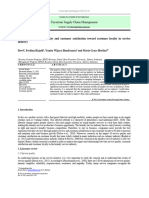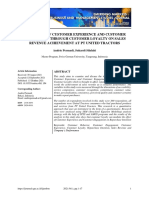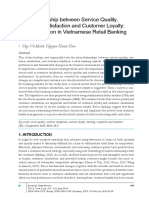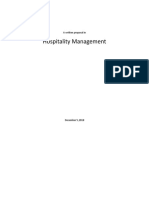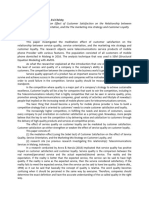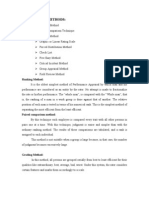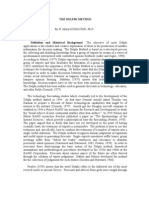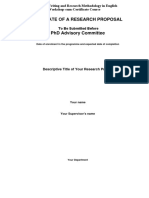The Influence of Service Quality On Customer Loyalty Mediated by Customer Satisfaction and Customer Delight at Kusuma Bali Mandiri
The Influence of Service Quality On Customer Loyalty Mediated by Customer Satisfaction and Customer Delight at Kusuma Bali Mandiri
Volume 10, Issue 4, April – 2025 International Journal of Innovative Science and Research Technology
ISSN No:-2456-2165 https://doi.org/10.38124/ijisrt/25apr1229
The Influence of Service Quality on Customer
Loyalty Mediated by Customer Satisfaction and
Customer Delight at Kusuma Bali Mandiri
Ni Komang Ari Kusuma Dewi1; Ni Putu Nita Anggraini2;
Ni Putu Cempaka Dharmadewi Atmaja3
1
Magister of Management Mahasaraswati Denpasar University Denpasar, Indonesia
2
Lecturer Magister of Management Mahasaraswati Denpasar University Denpasar, Indonesia
3
Lecturer Magister of Management Mahasaraswati Denpasar University Denpasar, Indonesia
Publication Date: 2025/05/01
Abstract: This study aims to evaluate the impact of service quality on customer loyalty at UD Kusuma Bali Mandiri,
considering customer satisfaction and customer delight as intervening variables. This quantitative research utilizes data
from last year’s customers. Although the exact population is unknown due to potential differences in customer identities,
the sample size is determined using the 10 times rule from Hair et al. (2012), which is 14 indicators multiplied by 10,
resulting in a sample of 140 respondents. Data analysis is conducted using Structural Equation Modeling (SEM) with a
Partial Least Squares (PLS) approach. The research is conducted at UD Kusuma Bali Mandiri across four branches in
Bali, namely Karangasem, Klungkung, Gianyar, and Tabanan. The analysis results indicate that service quality has a
positive and significant impact on customer loyalty. Additionally, service quality also has a positive and significant effect
on customer and customer delight. Customer satisfaction is found to mediate the effect of service quality on customer
loyalty, while customer delight also acts as a mediator in this relationship. Higher service quality leads to higher levels of
customer satisfaction and customer delight, which in turn enhances customer loyalty. These findings underscore the
importance of improving service quality to achieve high levels of customer satisfaction and delight, as well as to build and
maintain customer loyalty.
Keywords: Customer Loyalty; Service Quality; Customer Satisfaction; Customer Delight; SEM-PLS.
How to Cite: Ni Komang Ari Kusuma Dewi; Ni Putu Nita Anggraini; Ni Putu Cempaka Dharmadewi Atmaja (2025). The
Influence of Service Quality on Customer Loyalty Mediated by Customer Satisfaction and Customer Delight at Kusuma
Bali Mandiri. International Journal of Innovative Science and Research Technology, 10(4), 2014-2026.
https://doi.org/10.38124/ijisrt/25apr1229
I. INTRODUCTION loyalty. This loyalty not only facilitates business growth and
drives sales but also serves as a critical indicator of customer
In the era of globalization, companies are confronted satisfaction and the ability to meet consumer expectations.
with increasingly intense global competition, compelling them Kusuma Bali Mandiri, engaged in the retail of electronic
to prioritize fulfilling consumer needs and desires. The goods and furniture, places a strong emphasis on providing
cornerstone of success lies in delivering value and satisfaction quality products and exceptional service to cultivate strong
through high-quality products and services at competitive emotional bonds with customers. By offering the latest
prices. By offering superior products and services compared technological devices and a diverse array of high-quality
to their competitors, companies can foster customer furniture, the company endeavors to meet the digital and
satisfaction and, in turn, enhance customer loyalty [1]. In a spatial needs of its consumers. Customer transaction data
highly competitive business landscape, a company's from 2019 to 2023 reflects business growth across its various
sustainability and success are intrinsically linked to customer branches.
Table 1 Number of Customer Visits Resulting in Transactions at Kusuma Bali Mandiri from 2019-2023
Year Increase / Decrease [%]
Company Branch
2019 2020 2021 2022 2023
Karangasem 1701 753 1209 1679 1371 -19,40%
Klungkung 1281 689 1101 1221 1072 -16,32%
IJISRT25APR1229 www.ijisrt.com 2014
Volume 10, Issue 4, April – 2025 International Journal of Innovative Science and Research Technology
ISSN No:-2456-2165 https://doi.org/10.38124/ijisrt/25apr1229
Gianyar 1051 436 510 610 1041 -0,95%
Tabanan 1037 502 926 1026 1000 -3,57%
TOTAL 5070 2380 3746 4536 4484 -11,56%
Source: Processed Primary Data, 2024
Customer visit data at Kusuma Bali Mandiri branches memorable [14] (Dam and Dam 2021). Additionally,
reveals a significant decline from 2019 to 2023. The satisfaction tends to be cognitive, albeit involving affective
Karangasem branch experienced the most substantial aspects, whereas customer delight is entirely affective [3],
decrease at 19.40%, followed by Klungkung with a 16.32% [15].
reduction. The Gianyar branch demonstrated relative stability
with a slight decline of 0.95%, while Tabanan saw a decrease This research aims to explore how service quality can
of 3.57%. Overall, customer visits across all branches be enhanced through strategies involving customer delight
declined by 11.56%, reflecting challenges in maintaining and customer satisfaction. This approach responds to
customer loyalty. This significant decline underscores the negative findings from previous studies, such as [16] and
difficulties in sustaining customer loyalty. Key factors [17], which suggest that service quality may negatively
influencing customer loyalty include service quality [2], impact customer loyalty and satisfaction. The study will
customer satisfaction [3], and customer delight [4]. focus on customer delight and customer satisfaction as
intervening variables to provide a deeper understanding of
A reassessment of service quality is critical, as it is a how service quality influences customer loyalty at Kusuma
fundamental aspect for customers. Service quality elements Bali Mandiri.
such as prompt responsiveness, proactive complaint
handling, friendliness, and proper ethics play a crucial role in The research aims to analyze the impact of service
meeting customer expectations. Enhancing service quality is quality on customer loyalty at Kusuma Bali Mandiri, with
expected to boost customer satisfaction [5],[6]. Kusuma Bali particular emphasis on the roles of customer satisfaction and
Mandiri prioritizes service quality to deliver a superior customer delight as mediating variables. The research
shopping experience. The company focuses on questions address the relationships between service quality,
responsiveness, providing clear product information, and customer satisfaction, customer delight, and customer
ensuring adequate stock availability. Employees are trained loyalty, as well as how satisfaction and customer delight
to offer friendly and professional service, creating a positive mediate the impact of service quality on customer loyalty.
shopping atmosphere. The objective of this study is to contribute to the theoretical
development of marketing management literature and
Kusuma Bali Mandiri also ensures high product quality, provide practical benefits to Kusuma Bali Mandiri in
promptly addresses customer complaints, and offers loyalty designing strategies to improve service quality, customer
programs and discounts. Additionally, the company satisfaction, and loyalty. This research is focused on the
maintains fast delivery times and keeps its physical stores operations of the company, which sells furniture and
and website well-maintained, with the aim of enhancing electronics across various branches, to provide insights and
customer satisfaction and achieving sustainable growth. strategic recommendations to enhance the company’s
performance and competitiveness.
Research indicates that optimal service quality
enhances customer loyalty toward products and brands [6], II. LITERATURE THEORY
[7]. The alignment between service quality and consumer
expectations drives repeat purchases (Hafidz and Muslimah Social Cognitive Theory (SCT)
2023). However, some studies suggest that service quality Social Cognitive Theory (SCT), originally known as
does not always have a significant impact on customer Social Learning Theory (SLT), was introduced in the 1960s
loyalty due to the varying perceptions of individual by Albert Bandura [18]. The theory evolved into SCT in
customers [8], [9]. Beyond service quality, customer delight 1986, positing that learning occurs within a social context
is also a crucial factor in this study. The term gained through dynamic and reciprocal interactions between
prominence in the 1990s and centered on emotional benefits individuals, their environment, and behavior. A distinctive
and hedonistic consumption experiences [10], [11]. In feature of SCT is its emphasis on social influences, along
marketing, customer delight is understood through the with the importance of both external and internal social
confirmation-disconfirmation paradigm, where satisfaction reinforcement. Applying Social Cognitive Theory (SCT) to
occurs when performance exceeds expectations, or from an research on loyalty, service quality, customer delight, and
affect-based perspective, where customer delight is a customer satisfaction is grounded in several compelling
combination of excitement and pleasant surprise [1], [12]. reasons. SCT considers the dynamic interplay between
individuals, their environment, and behavior, offering a
Customer delight arises from fulfilling expectations and holistic perspective on customer behavior. The theory
involves satisfaction that surpasses them, often resulting in underscores the significance of social influences and
higher loyalty compared to mere satisfaction [13]. The reinforcement in shaping customer behavior. Furthermore,
primary difference between customer delight and satisfaction SCT accounts for past experiences as critical factors in
is the element of surprise; customer delight includes intense determining current and future behavior. Through this
excitement and pleasure, making the experience more approach, SCT provides practical insights that can aid in
IJISRT25APR1229 www.ijisrt.com 2015
Volume 10, Issue 4, April – 2025 International Journal of Innovative Science and Research Technology
ISSN No:-2456-2165 https://doi.org/10.38124/ijisrt/25apr1229
designing effective service strategies to enhance customer Customer Satisfaction
loyalty and satisfaction. Customer satisfaction is defined as a subjective
evaluation reflecting an individual’s pleasure or
Customer Loyalty disappointment after comparing the actual performance of a
Customer loyalty is defined as the degree to which an product or service with their expected standards [19].
individual is inclined to remain faithful and maintain Evaluating customer satisfaction involves understanding
relationships with a specific individual, group, or specific indicators that reveal aspects influencing customer
organization [19] (Kotler and Armstrong, 2019). It serves as perceptions and responses. Key dimensions include
a reliable metric for predicting sales growth and is also Expectation Fulfillment, which measures the reliability of the
characterized by consistent purchasing behavior [20]. product or service and the quality of customer service
Indicators of customer loyalty encompass several interactions; Repurchase Intent, which assesses the impact of
dimensions: making regular repeat purchases, purchasing loyalty programs and service innovation on the likelihood of
across product and service lines, referring others, and future purchases; and Willingness to Recommend, which
demonstrating immunity to competitive appeals [21], [22]. evaluates how customers share positive experiences through
Regular repeat purchases are evidenced by customers social media and participation in referral programs [4], [24].
consistently buying from the company periodically and By incorporating these specific indicators, the research aims
returning for further shopping, reflecting their loyalty and to provide a comprehensive understanding of factors
satisfaction. Purchasing across product and service lines contributing to customer satisfaction, thereby aiding
involves customers trying or buying various products offered companies in enhancing their customer relationships and
by the company, indicating a willingness to explore different developing more effective strategies to boost satisfaction,
offerings. Referring others involves customers providing repurchase intent, and referral willingness.
positive recommendations about the company's products or
actively encouraging others to make purchases. Customer Delight
Demonstrating immunity to competitive appeals is seen in Customer delight refers to the response of buyers when
customers believing that the company’s products or services the service received exceeds their expectations. Marketers
are superior to competitors' and showing a preference to employ various strategies to evoke such positive reactions
remain loyal despite competitive offers or promotions. The from customers [25]. Customer delight occurs when
use of these research variables is crucial as they consumers express high levels of satisfaction due to services
comprehensively capture the multifaceted nature of customer that surpass their initial expectations [26]. To evaluate
loyalty, providing a nuanced understanding of how loyalty customer delight effectively, it is crucial to understand the
manifests in various behaviors and interactions. specific indicators for each dimension, which reveal the
extent to which consumers experience joy beyond their
Service Quality anticipations. The dimensions include Justice, Esteem, and
Service quality is defined as the condition in which Finishing Touch. Indicators for Justice involve providing
consumers assess the disparity between their expectations of accurate product information, ensuring high value, avoiding
a product or service and their perceptions of the performance excessive profit margins, and delivering realistic promotions.
they receive [2]. The success of a company largely hinges on Esteem is reflected in personal treatment, attentive staff, and
its ability to meet consumer expectations, which can be staff's genuine interest in helping. Finishing Touch
considered a competitive advantage [22]. Evaluating service encompasses responsibility for customer complaints,
quality involves understanding various dimensions that shape building consumer trust, and delivering more than expected
the customer experience, including Tangibles, Empathy, [27], [28]. By focusing on these indicators, the research aims
Responsiveness, Reliability, and Assurance [23]. Tangibles to gauge how well services exceed customer expectations,
refer to the physical aspects of service delivery, such as the which is essential for designing strategies that enhance
appearance and discipline of staff, the comfort and overall customer satisfaction and foster loyalty.
accessibility of the service environment, and the use of
service aids. Empathy involves prioritizing customer needs, Based on the Explanation Provided, the Hypotheses for
demonstrating friendliness, politeness, non-discriminatory this Research are as Follows:
service, and respect. Responsiveness pertains to the
promptness and accuracy in addressing customer requests, H1. Service quality positively affects customer loyalty.
handling complaints, and providing timely service. H2. Service quality positively affects customer
Reliability includes the precision of service delivery, satisfaction.
adherence to clear service standards, and the proficiency of H3. Service quality positively affects customer delight.
staff in using service tools. Assurance encompasses the H4. Customer satisfaction positively affects customer
provision of timely service guarantees, cost assurances, and loyalty.
legal assurances. Using these service quality variables is H5. Customer delight positively affects customer loyalty.
essential for understanding how different dimensions H6. Customer satisfaction acts as an intervening variable
contribute to overall service performance and customer in the relationship between service quality and customer
satisfaction. loyalty.
H7. Customer delight acts as an intervening variable in
the relationship between service quality and customer
loyalty.
IJISRT25APR1229 www.ijisrt.com 2016
Volume 10, Issue 4, April – 2025 International Journal of Innovative Science and Research Technology
ISSN No:-2456-2165 https://doi.org/10.38124/ijisrt/25apr1229
The conceptual framework illustrating the relationships directly and online. To ensure the validity and reliability of
between the variables under study, which include service the instruments, content and construct validity, as well as
quality (X1), customer loyalty (Y1), customer satisfaction internal reliability, are tested using statistical analysis. Data
(Y2), and customer delight (Y3), is depicted in Figure 1 analysis is performed using Partial Least Squares Structural
below. Equation Modeling (PLS-SEM) to evaluate the relationships
between variables and test the research hypotheses.
IV. RESULT AND DISCUSSION
A. Characteristics Respondent
The respondent characteristics in this study involve 140
customers of Kusuma Bali Mandiri, encompassing complete
identity details such as gender, age, and highest level of
education. Among the 140 respondents, 53% are male and
47% are female, indicating a relatively balanced interest in
services between the two genders. Age analysis reveals that
the majority of respondents are between 20 and 30 years old
(44%) and between 40 and 50 years old (33%), while 17%
fall within the 31 to 40-year age bracket, and only 6% are
over 50 years old. In terms of education, 41% of respondents
have an educational background of elementary, junior high,
or high school, 31% hold a bachelor's degree, 24% possess a
diploma, and 4% have a postgraduate degree. This data
indicates that Kusuma Bali Mandiri's customers generally
Fig 1 Conceptual Model
come from a productive age group with diverse educational
backgrounds, highlighting the importance of tailoring
III. METHODS
services to meet the varied needs and preferences of the
customer base.
The research employs a quantitative approach with a
survey method to examine the relationships among service
B. Pilot Test
quality, customer loyalty, customer satisfaction, and
A pilot test was conducted to assess the validity and
customer delight. The study population consists of all
reliability of the research instruments before distributing the
customers of Kusuma Bali Mandiri, with a sample of 140
questionnaire to the respondents. The questionnaire was
respondents selected through a questionnaire as the data
initially tested with 30 respondents. The purpose of this test
collection tool. The operational definitions of the variables
is to ensure that the instrument functions effectively and is
include customer loyalty, service quality, customer
relevant to the context of the ongoing research. The results of
satisfaction, and customer delight, which are measured using this test are presented in the following table.
specific indicators such as the frequency of repeat purchases,
facility appearance, and service responsiveness. Data
collection is conducted via questionnaires distributed both
Table 2 Pilot Test 30 sample
Variable Indicators Pearson correlation Cronbach’s Alpha
X1.1 0.993
X1.2 0.938
X1.3 0.966
X1.4 0.966
X1.5 0.993
Service Quality (X1) 0.993
X1.6 0.993
X1.7 0.966
X1.8 0.882
X1.9 0.993
X1.10 0.993
Y1.1 0.938
Y1.2 0.703
Customer Loyalty (Y1) 0.831
Y1.3 0.856
Y1.4 0.812
Y2.1 0.943
Y2.2 0.894
Customer Satisfaction (Y2) 0.946
Y2.3 0.946
Y2.4 0.846
IJISRT25APR1229 www.ijisrt.com 2017
Volume 10, Issue 4, April – 2025 International Journal of Innovative Science and Research Technology
ISSN No:-2456-2165 https://doi.org/10.38124/ijisrt/25apr1229
Variable Indicators Pearson correlation Cronbach’s Alpha
Y2.5 0.944
Y2.6 0.946
Y3.1 0.923
Y3.2 0.853
Y3.3 0.842
Customer Delight (Y3) 0.944
Y3.4 0.926
Y3.5 0.914
Y3.6 0.849
Source: Processed Primary Data, 2024
Based on Table 2, all indicators for the variables loyalty was also rated very high, with an average score of
Service Quality (X1), Customer Loyalty (Y1), Customer 4.23, indicating that customers routinely make purchases,
Satisfaction (Y2), and Customer Delight (Y3) exhibit buy products from various lines, and view Kusuma Bali
Pearson correlation values significantly exceeding 0.3, Mandiri as an indispensable retail establishment. Although
indicating that all indicators are valid. Additionally, all there is room for improvement in the promotion of non-
variables (X1, Y1, Y2, Y3) have Cronbach's Alpha values furniture products, overall, these results reflect a strong
above 0.7, demonstrating that these variables are reliable. relationship successfully established with customers.
Customer satisfaction was also categorized as "Very High,"
C. Descriptive Analysis of Research Variables with an average score of 4.21, where service meeting
Based on the results of the descriptive analysis of the expectations had the highest rating (4.31). Nonetheless, the
questionnaire data, the service quality at Kusuma Bali interest in returning related to loyalty programs had a slightly
Mandiri received an average rating of "Very High" with a lower score (4.15), possibly due to a lack of compelling
score of 4.27. Indicators such as physical evidence, empathy, promotions. Finally, customer delight achieved an average
responsiveness, reliability, and assurance all received score of 4.20, with promotions matching reality (4.27) being
positive responses, with the highest score attributed to the the highest, indicating a high level of emotional satisfaction
responsiveness of employees (4.29). with the services and products.
However, there were shortcomings related to parking D. Outer Model Evaluation
facilities and service assurance, particularly concerning
Polytron product repairs, which, despite being caused by Convergent Validity Test.
supplier delays, affected customer perceptions. Customer
Table 3 Convergent Validity Test (Outer Loading Value)
Variable Indicators Outer Model Value Result
X1.1 0,940 Valid
X1.2 0,938 Valid
X1.3 0,956 Valid
X1.4 0,928 Valid
X1.5 0,955 Valid
Service Quality (X1)
X1.6 0,969 Valid
X1.7 0,942 Valid
X1.8 0,922 Valid
X1.9 0,945 Valid
X1.10 0,956 Valid
Y1.1 0,966 Valid
Y1.2 0,921 Valid
Customer Loyalty (Y1)
Y1.3 0,953 Valid
Y1.4 0,901 Valid
Y2.1 0,926 Valid
Y2.2 0,915 Valid
Y2.3 0,853 Valid
Customer Satisfaction (Y2)
Y2.4 0,929 Valid
Y2.5 0,930 Valid
Y2.6 0,950 Valid
Y3.1 0,970 Valid
Y3.2 0,936 Valid
Customer Delight (Y3) Y3.3 0,941 Valid
Y3.4 0,934 Valid
Y3.5 0,931 Valid
IJISRT25APR1229 www.ijisrt.com 2018
Volume 10, Issue 4, April – 2025 International Journal of Innovative Science and Research Technology
ISSN No:-2456-2165 https://doi.org/10.38124/ijisrt/25apr1229
Variable Indicators Outer Model Value Result
Y3.6 0,919 Valid
Source: Processed Primary Data, 2024
Based on Table 3, the outer model testing indicates that extracted (AVE) value, with an AVE value greater than 0.50
all indicators have outer loading values above 0.50, meeting indicating adequate construct validity. The AVE values for
the criteria for convergent validity. Additionally, construct the convergent validity test are presented in Table 4.
validity is also assessed through the average variance
Table 4 Convergent Validity (AVE Value)
Variable AVE Value Ket
Service Quality (X1) 0.893 Valid
Customer Loyalty (Y1) 0.875 Valid
Customer Satisfaction (Y2) 0.842 Valid
Customer Delight (Y3) 0.881 Valid
Source: Processed Primary Data, 2024
The results of the convergent validity test, as reflected assessed through cross-loadings, where a scale is considered
by the Average Variance Extracted (AVE) values in Table to have discriminant validity if the cross-loading correlation
4, indicate that all constructs, including service quality, with the latent variable is higher than its correlations with
customer loyalty, customer satisfaction, and customer other latent variables. Additionally, discriminant validity
delight, exhibit AVE values exceeding 0.50. This signifies can be evaluated by comparing the square root of the
that all variables employed in the study are deemed valid. average variance extracted (√AVE) using the Fornell-
Larcker criterion. A model is deemed to have good
Discriminant Validity. discriminant validity if the √AVE values for each variable
Discriminant validity ensures that different constructs are greater than the correlations between variables. These
are not highly correlated with one another. This validity is measurement results are presented in Tables 5 and 6.
Table 5 Discriminant Validity (Cross Loading Value)
Service Quality Customer Loyalty Customer Satisfaction Customer Delight
KualL1 0.940 0.824 0.859 0.853
KualL2 0.938 0.831 0.811 0.804
KualL3 0.956 0.789 0.820 0.802
KualL4 0.928 0.820 0.806 0.786
KualL5 0.955 0.803 0.837 0.812
KualL6 0.969 0.827 0.851 0.833
KualL7 0.942 0.806 0.815 0.808
KualL8 0.922 0.841 0.893 0.876
KualL9 0.945 0.801 0.842 0.812
KualL10 0.956 0.814 0.845 0.823
LoyPel1 0.831 0.966 0.838 0.850
LoyPel2 0.799 0.921 0.828 0.796
LoyPel3 0.792 0.953 0.842 0.888
LoyPel4 0.809 0.901 0.832 0.809
KepPel1 0.783 0.796 0.926 0.854
KepPel2 0.826 0.829 0.915 0.856
KepPel3 0.738 0.748 0.853 0.757
KepPel4 0.862 0.826 0.929 0.897
KepPel5 0.826 0.86 0.930 0.866
KepPel6 0.844 0.848 0.950 0.904
CusDe1 0.830 0.882 0.898 0.97
CusDe2 0.839 0.809 0.896 0.936
CusDe3 0.791 0.843 0.845 0.941
CusDe4 0.763 0.823 0.881 0.934
CusDe5 0.851 0.854 0.879 0.931
CusDe6 0.817 0.823 0.859 0.919
Source: Processed Primary Data, 2024
IJISRT25APR1229 www.ijisrt.com 2019
Volume 10, Issue 4, April – 2025 International Journal of Innovative Science and Research Technology
ISSN No:-2456-2165 https://doi.org/10.38124/ijisrt/25apr1229
Table 6 Discriminant Validity (Fornell-Larcker Criterion)
Customer Delight Customer Satisfaction Service Quality Customer Loyalty
Customer Delight 0.938
Customer Satisfaction 0.934 0.918
Service Quality 0.869 0.887 0.945
Source: Processed Primary Data, 2024
The results of the discriminant validity test indicate Composite Reliability.
that both the cross-loading values and the Fornell-Larcker The reliability test in this study employed both
Criterion test reflect strong discriminant validity. The composite reliability and Cronbach's Alpha to assess the
correlations between indicators and their respective internal consistency of the construct indicators. A composite
constructs are higher compared to correlations with other reliability value above 0.60 is deemed acceptable, while
constructs. Additionally, the square root of the Average Cronbach's Alpha must exceed 0.70 to be considered
Variance Extracted (√AVE) values exceed the correlations reliable. The results of the reliability tests indicate that the
among latent variables, thus demonstrating that the research instruments used in this study meet the accepted criteria for
data meet the criteria for good discriminant validity. reliability.
Table 7 Composite Reliability and Cronbach’s Alpha
Cronbach’s Alpha Composite Reliability Ket.
Service Quality (X1) 0.987 0.988 Valid
Customer Loyalty (Y1) 0.952 0.966 Valid
Customer Satisfaction (Y2) 0.962 0.970 Valid
Customer Delight (Y3) 0.973 0.978 Valid
Source: Processed Primary Data, 2024
Based on Table 7, it is observed that the Cronbach's loyalty has an R-Square (R²) value of 0.839. This indicates
Alpha and composite reliability values for each variable that 83.9% of the variability in customer loyalty can be
exceed 0.60. This indicates that the measurement scales explained by the variability in service quality, with the
employed in the study meet the criteria for reliability. remaining 16.1% attributable to factors outside the scope of
this study. Similarly, the models evaluating the impact of
E. Inner Model Evaluation service quality on customer satisfaction and customer delight
have R-Square (R²) values of 0.787 and 0.756, respectively.
R-Square This suggests that 78.7% and 75.6% of the variability in
The R-Square analysis aims to measure the degree of customer satisfaction and customer delight can be explained
variance explained by the independent variables on the by service quality, while 21.3% and 24.4% are explained by
dependent variable. A higher R² value indicates a more variables beyond the study's scope. Examples of such
effective predictive model of the research model [29]. The R² external factors may include employee performance,
results are presented in the table 8. Based on Table 8, the commitment, work discipline, and others.
model assessing the impact of service quality on customer
Table 8 R-Square Test
R-Square
Customer Loyalty 0.839
Customer Satisfaction 0.787
Customer Delight 0.756
Source: Processed Primary Data, 2024
Q-Square The obtained Q-Square (Q²) value is 0.9916. This value
The Q-Square (Q²) value is calculated to determine the exceeds 0, indicating that 99.16% of the variation in
predictive relevance of the model and the estimated customer loyalty, customer satisfaction, and customer delight
parameters. The Q-Square (Q²) value is computed as follows: is explained by service quality, while 0.84% is attributed to
other variables outside the scope of the research variables.
Q2 = 1 – (1 – R12) (1 – R22) (1 – R32)
= 1 – (1 – 0,839) (1 – 0,787) (1 – 0,756) Goodness of Fit (GoF)
= 1 – (0,161) (0,213) (0,244) Goodness of Fit (GoF) is a measure in PLS-SEM that
= 1 – 0,008367492 assesses the fit of the empirical data with the research model,
= 0,9916 combining the quality of measurement (outer model) and
structural model (inner model). GoF is calculated by
multiplying the average AVE and average R², and then
taking the square root of the result. For example, with an
IJISRT25APR1229 www.ijisrt.com 2020
Volume 10, Issue 4, April – 2025 International Journal of Innovative Science and Research Technology
ISSN No:-2456-2165 https://doi.org/10.38124/ijisrt/25apr1229
average AVE of 0.8725 and an average R² of 0.794, the GoF F. Hypotheses Test
value obtained is 0.8327. This value indicates an excellent
model fit, with a high GoF reflecting the validity and Direct Effect Testing
reliability of the research model. In this study, only direct effect testing is utilized for
hypothesis testing. Two criteria must be met: the p-value
must be less than the alpha level of 5% (<0.05), and the t-
statistic must exceed 1.96 (>1.96). The significance results
for each variable relationship are presented in the following
table.
Table 9 Direct Effect Testing
Original Sample Mean Standard Deviation T Statistics P
Sample (O) (M) (STDEV) (|O/STDEV|) Values
Service Quality Customer Loyalty 0.261 0.245 0.108 2.424 0.016
Customer Loyalty Customer
0.887 0.882 0.042 21.245 0.000
Satisfaction
Customer Loyalty Customer Delight 0.869 0.862 0.047 18.52 0.000
Customer Satisfaction Customer
0.294 0.301 0.143 2.057 0.040
Loyalty
Customer Delight Customer Loyalty 0.393 0.396 0.126 3.107 0.002
Source: Processed Primary Data, 2024
Based on Table 9, the results of the direct effects between H5: Customer delight has a positive and significant effect
variables are as follows: on customer loyalty, with a path coefficient of 0.393 and
a p-value of 0.002.
H1: Service quality has a positive and significant effect
on customer loyalty, with a path coefficient of 0.261 and Thus, all hypotheses in this study are accepted,
a p-value of 0.016. indicating that service quality, customer satisfaction, and
H2: Service quality has a positive and significant effect customer delight significantly influence customer loyalty at
on customer satisfaction, with a path coefficient of 0.887 Kusuma Bali Mandiri.
and a p-value of 0.000.
H3: Service quality has a positive and significant effect Indirect Effect Testing
on customer delight, with a path coefficient of 0.869 and The analysis of the indirect effects, examining the
a p-value of 0.000. mediating roles of customer satisfaction and customer delight
H4: Customer satisfaction has a positive and significant in the relationship between service quality and customer
effect on customer loyalty, with a path coefficient of loyalty, is presented in the table below.
0.294 and a p-value of 0.040.
Table 10 Indirect Effect Testing
Original Sample Standard Deviation T Statistics P
Sample (O) Mean (M) (STDEV) (|O/STDEV|) Values
Service Quality Customer
0.261 0.266 0.129 2.022 0.002
Satisfaction Customer Loyalty
Service Quality Customer Delight
0.342 0.341 0.111 3.086 0.044
Customer Loyalty
Source: Processed Primary Data, 2024
According to Table 10, the results of the indirect effect study are supported, indicating that customer satisfaction and
analysis indicate that both customer satisfaction and customer delight each serve as significant mediators in this
customer delight mediate the impact of service quality on relationship.
customer loyalty. The path coefficient for customer
satisfaction is 0.261 with a p-value of 0.002, and for Mediation Effect Testing
customer delight, the path coefficient is 0.342 with a p-value The mediation effects in this study are based on the
of 0.044. These values suggest that both mediating variables mediation testing framework proposed by Hair et al. (2017:
significantly influence the relationship between service 248). The explanation of these mediation effects is presented
quality and customer loyalty. Therefore, H6 and H7 in this in the table below.
IJISRT25APR1229 www.ijisrt.com 2021
Volume 10, Issue 4, April – 2025 International Journal of Innovative Science and Research Technology
ISSN No:-2456-2165 https://doi.org/10.38124/ijisrt/25apr1229
Table 11 Mediation Effect Testing
Effect
Result
p1 p2 p3
Service Quality Customer Satisfaction 0.000 0.040 0.016 Complementary Partial
Customer Loyalty (Sig.) (Sig.) (Sig.) Mediation
Service Quality Customer Delight 0.000 0.002 0.016 Complementary Partial
Customer Loyalty (Sig.) (Sig.) (Sig.) Mediation
Source: Processed Primary Data, 2024
Note: significancy (Sig.) = p-value <0,05 0.05. This finding suggests that improvements in service
quality significantly enhance customer satisfaction.
p1 = The direct effect of the exogenous variable (X) on the Respondent evaluations of service quality were rated very
mediator variable (Z) highly, with indicators such as physical evidence, reliability,
p2 = The direct effect of the mediator variable (Z) on the responsiveness, assurance, and empathy receiving very
endogenous variable (Y) positive feedback. Specifically, the statement regarding
p3 = The direct effect of the exogenous variable (X) on the employee response speed received the highest score,
endogenous variable (Y) reflecting professionalism and efficiency. Customer
satisfaction was also rated very high, with the statement
According to Table 11, both customer satisfaction and "service alignment with customer expectations" achieving
customer delight can partially mediate the impact of service the highest score, indicating that service exceeds customer
quality on customer loyalty in a complementary manner. expectations. Additionally, high scores in product fit,
Customer satisfaction shows path coefficients of 0.887 and innovation, and recommendations reflect a very high level of
0.294, with p-values of 0.000 and 0.040, respectively, while satisfaction. These findings are consistent with previous
customer delight exhibits path coefficients of 0.869 and research by [33], [34], and [35], which confirms that service
0.393, with p-values of 0.000 and 0.002, respectively. quality positively affects customer satisfaction. Research by
Additionally, the direct effect of service quality on customer [4] and [36] also supports these results, demonstrating the
loyalty is also significant, with a path coefficient of 0.261 positive impact of service quality on customer satisfaction. In
and a p-value of 0.016. conclusion, superior service quality significantly enhances
customer satisfaction, highlighting the importance for
G. Discussion Kusuma Bali Mandiri to continually improve service quality
to maintain and increase customer satisfaction and strengthen
Impact of Service Quality on Customer Loyalty the company’s positive reputation.
The study on the impact of service quality on customer
loyalty at Kusuma Bali Mandiri reveals that service quality Impact of Service Quality on Customer Delight
has a positive and significant effect on customer loyalty, as The analysis reveals that service quality has a positive
evidenced by a positive path coefficient and a p-value less and significant impact on customer delight at Kusuma Bali
than 0.05. This indicates that improvements in service quality Mandiri, with a positive path coefficient and a p-value <
significantly enhance customer loyalty. Customers who 0.05. This indicates that service quality significantly affects
receive high-quality service are more likely to remain loyal customer delight, meaning that improvements in service
and make repeat purchases. Survey results show very quality led to experiences that exceed customer expectations,
positive evaluations across all service quality dimensions, resulting in heightened satisfaction and positive impressions.
with particular emphasis on the speed of employee response, Respondent evaluations of service quality were very high,
which received the highest rating, reflecting professionalism with indicators such as physical evidence, reliability,
and efficiency. Additionally, customer loyalty is rated highly, responsiveness, assurance, and empathy receiving very
particularly regarding the commitment to repeat purchases positive feedback. Particularly, the statement regarding
and the belief that Kusuma Bali Mandiri is the best retailer employee response speed received the highest score,
with no competitors. These findings align with previous reflecting professionalism and efficiency. Customer delight
research by [30], [31], and [32], which identified a positive ratings were also very high, with the statement “alignment of
and significant impact of service quality on customer loyalty. Kusuma Bali Mandiri’s promotions with reality” achieving
Similar findings are supported by [24] and [9], highlighting the highest score, indicating that promotions meet customer
that superior service quality positively affects customer expectations effectively. These findings align with previous
loyalty. The conclusion of this research underscores the need research by [3], [37], [38], and [39], which confirms that
for Kusuma Bali Mandiri to continually focus on enhancing service quality positively and significantly influences
service quality to strengthen customer loyalty, build long- customer delight. Superior service quality contributes to
term relationships, and improve both its reputation and creating highly satisfying customer experiences that exceed
business performance. expectations, reinforcing customer relationships and
enhancing the company's positive reputation. Consequently,
Impact of Service Quality on Customer Satisfaction Kusuma Bali Mandiri should continue focusing on
The analysis indicates that service quality has a positive improving service quality, including accuracy of information,
and significant impact on customer satisfaction at Kusuma alignment of promotions, and exceptional service, to
Bali Mandiri, with a positive path coefficient and a p-value < strengthen customer relationships, encourage positive
IJISRT25APR1229 www.ijisrt.com 2022
Volume 10, Issue 4, April – 2025 International Journal of Innovative Science and Research Technology
ISSN No:-2456-2165 https://doi.org/10.38124/ijisrt/25apr1229
recommendations, and enhance the company’s market customer delight significantly boosts customer loyalty.
reputation. Therefore, Kusuma Bali Mandiri should focus on enhancing
service quality and ensuring consistent and satisfying
Impact of Customer Satisfaction on Customer Loyalty customer experiences to strengthen customer relationships
The analysis indicates that customer satisfaction has a and maintain a competitive market position.
positive and significant impact on customer loyalty at
Kusuma Bali Mandiri, with a positive path coefficient and a Impact of Service Quality on Customer Loyalty with
p-value < 0.05. This suggests that higher levels of customer Customer Satisfaction as an Intervening Variable
satisfaction significantly enhance customer loyalty, meaning The analysis of the impact of service quality on
that satisfying experiences lead to greater customer retention customer loyalty with customer satisfaction as an intervening
and repeat purchases. The average customer satisfaction variable shows a positive path coefficient with a p-value <
rating was in the “Very High” category, with the statement “I 0.05. This indicates that customer satisfaction significantly
feel that the service at Kusuma Bali Mandiri meets my mediates the relationship between service quality and
expectations” scoring the highest. Customer loyalty also customer loyalty. The hypothesis H6, which posits that
showed very positive results, with the statement “I will service quality affects customer loyalty through customer
regularly make purchases at Kusuma Bali Mandiri” satisfaction, is supported. Both the indirect effects of service
achieving the highest score. This positive correlation implies quality on customer satisfaction (p1) and customer
that high customer satisfaction, particularly related to service satisfaction on customer loyalty (p2) are significant, as well
and products that exceed expectations, contributes to strong as the direct effect of service quality on customer loyalty
customer loyalty, driving repeat purchases and positive (p3). This supports a partial mediation model where
recommendations. Previous research supports these findings, customer satisfaction mediates the relationship between
showing that customer satisfaction positively and service quality and customer loyalty. Respondent feedback
significantly influences customer loyalty. For instance, [40] on service quality at Kusuma Bali Mandiri shows a very high
demonstrated that customer satisfaction directly affects overall rating, with indicators such as physical evidence,
loyalty, confirming that satisfied customers are more likely reliability, responsiveness, assurance, and empathy receiving
to remain loyal. [41] also found a significant positive effect very positive evaluations. Notably, the statement on
of customer satisfaction on loyalty, indicating that companies employee response speed received the highest rating,
that meet or exceed customer expectations are more likely to reflecting professionalism and efficiency. Customer
build a loyal and sustainable customer base. Therefore, satisfaction also showed a very high average rating, with
maintaining high levels of customer satisfaction is crucial for fairness, appreciation, and attention scoring very positively.
strengthening customer loyalty, increasing purchase The statement “Kusuma Bali Mandiri’s promotions are
frequency, and mitigating competitive impacts. In summary, accurate” had the highest rating, indicating that promotions
there is a positive and significant relationship between are perceived as very accurate, enhancing satisfaction and
customer satisfaction and customer loyalty at Kusuma Bali trust. Customer loyalty ratings were also very high, with the
Mandiri. The company’s ability to meet or exceed customer statement “I will regularly make purchases at Kusuma Bali
expectations helps in building a loyal and sustainable Mandiri” scoring the highest, reflecting strong customer
customer base. The implication of these findings is that commitment. These findings are consistent with previous
Kusuma Bali Mandiri should continue to focus on enhancing research. For instance, [45] found that service quality is a key
customer satisfaction to bolster customer loyalty, which will element in the company-customer relationship and directly
strengthen customer relationships, boost purchase frequency, affects customer satisfaction. [35] emphasized that customer
and reduce competitive pressures. satisfaction is crucial for building customer loyalty through
positive service experiences. [46] and [31] also found that
Impact of Customer Delight on Customer Loyalty high customer satisfaction, driven by optimal service quality,
The analysis reveals that customer delight has a positive contributes to customer loyalty. Research by [47] and [9]
and significant impact on customer loyalty at Kusuma Bali showed that customer satisfaction positively impacts loyalty,
Mandiri, with a positive path coefficient and a p-value < as satisfied customers tend to maintain long-term
0.05. This indicates that increased customer delight relationships with the company. In summary, service quality
significantly enhances customer loyalty. High levels of plays a critical role in shaping customer loyalty, with
customer delight, driven by exceptional service experiences, customer satisfaction serving as a significant intervening
are crucial for building and maintaining customer loyalty. variable. Companies should continue to focus on enhancing
Respondent feedback on customer delight at Kusuma Bali service quality to achieve high levels of satisfaction, which in
Mandiri shows an overall very high rating, with indicators turn will strengthen customer loyalty and build long-term
such as fairness, appreciation, and attention receiving very beneficial relationships.
positive assessments. Notably, the statement “Kusuma Bali
Mandiri’s promotions are accurate” scored highest, reflecting Impact of Service Quality on Customer Loyalty with
that promotions meet customer expectations and boost Customer Delight as an Intervening Variable
satisfaction and trust. Similarly, loyalty scores were very The analysis of the impact of service quality on
high, particularly for the statement “I will regularly make customer loyalty with customer delight as an intervening
purchases at Kusuma Bali Mandiri,” indicating strong variable shows a positive path coefficient with a p-value <
customer commitment. These findings align with previous 0.05, indicating that customer delight significantly mediates
research by [42], [43], and [44] , which demonstrates that the relationship between service quality and customer
IJISRT25APR1229 www.ijisrt.com 2023
Volume 10, Issue 4, April – 2025 International Journal of Innovative Science and Research Technology
ISSN No:-2456-2165 https://doi.org/10.38124/ijisrt/25apr1229
loyalty. The hypothesis H7, which posits that service quality personalized service and exploring other factors affecting
affects customer loyalty through customer delight, is customer loyalty in future research may provide additional
supported. Both the indirect effects of service quality on insights for developing better service strategies.
customer delight (p1) and customer delight on customer
loyalty (p2) are significant, as is the direct effect of service REFERENCES
quality on customer loyalty (p3). This supports a partial
mediation model where customer delight mediates the [1]. B. A. Kurdi, M. Alshurideh, and A. Alnaser, “The
relationship between service quality and customer loyalty. impact of employee satisfaction on customer
Respondent feedback on service quality at Kusuma Bali satisfaction: Theoretical and empirical
Mandiri shows a very high overall rating, with indicators like underpinning,” 10.5267/j.msl, pp. 3561–3570, 2020,
physical evidence, reliability, responsiveness, assurance, and doi: 10.5267/j.msl.2020.6.038.
empathy receiving very positive evaluations. Particularly, the [2]. M. A. Triandewo and Y. Yustine, “Pengaruh Kualitas
statement on employee response speed received the highest Layanan, Citra Perusahaan, Dan Kepercayaan Pada
rating, reflecting professionalism and efficiency. Customer Loyalitas Konsumen,” JBA, vol. 22, no. 1, pp. 13–
delight also showed a very high average rating, with fairness, 24, Jun. 2020, doi: 10.34208/jba.v22i1.743.
appreciation, and final touches scoring very positively. The [3]. H. Alzoubi, M. Alshurideh, B. A. Kurdi, and M.
statement “Kusuma Bali Mandiri’s promotions make me Inairat, “Do perceived service value, quality, price
very satisfied” had the highest rating, indicating that fairness and service recovery shape customer
promotions are highly satisfying and enhance customer trust. satisfaction and delight? A practical study in the
Customer loyalty ratings were very high as well, with the service telecommunication context,” 10.5267/j.uscm,
statement “I will regularly make purchases at Kusuma Bali vol. 8, no. 1, pp. 579–588, 2020, doi:
Mandiri” scoring the highest, reflecting strong customer 10.5267/j.uscm.2020.2.005.
commitment. These findings are consistent with previous [4]. Y. Tenriawali, F. A. Lestari, F. G. Djunaidi, and A.
research. For example, [48] found that electronic service Yusdianti, “Pengaruh Harga Dan Kualitas Layanan
quality and system quality positively affect repurchase Terhadap Kepuasan Pelanggan Pengguna Platform
intentions online through customer delight as a mediator. Digital Ninja Express Di Kota Namlea,” Sosiologis:
[38] also found a significant positive effect of service quality Kajian Sosiologi Klasik, Modern Dan Kontemporer,
on customer loyalty with customer delight as an intervening vol. 1, no. 2, pp. 22–33, 2023, [Online]. Available:
variable. Additionally, research by [37] and [3] emphasized https://www.ojs.ycit.or.id/index.php/KTSK/article/vi
that customer delight, as a positive response to service ew/82
exceeding expectations, can strengthen customer attachment. [5]. Y. T. Hapsari, “Kepuasan Penumpang Terhadap
[49] added that ensuring customers are not only satisfied but Kualitas Layanan Aplikasi Online,” JEMBE, vol. 1,
delighted can strengthen emotional bonds and create a no. 1, pp. 1–7, Jul. 2023, doi:
continuous cycle from service quality to customer loyalty. In 10.31537/jembe.v1i1.1251.
summary, service quality positively impacts customer loyalty [6]. M. Andriyani and R. Ardianto, “Pengaruh Kualitas
through customer delight, creating a positive experience that Layanan dan Kualitas Produk Terhadap Kepuasan
enhances customer attachment to the company. Companies Nasabah Bank: (The Effect of Service Quality and
should focus on improving service quality to foster customer Product Quality on Bank Customer Satisfaction),”
delight, which will, in turn, strengthen customer loyalty and ekomabis. :. J. ekonomi manaj. n.a., vol. 1, no. 02,
build a positive reputation. pp. 133–140, Aug. 2020, doi:
10.37366/ekomabis.v1i02.73.
V. CONCLUSION [7]. O. T. Hadiwijaya, A. Kusumaningtyas, and A. Halik,
“Relationship between Service Quality and Customer
The research results indicate that service quality has a Delight and Customer Loyalty at the Fitness Center
positive and significant impact on customer loyalty, customer Business in East Java,” JAMREMS, vol. 2, no. 3, pp.
satisfaction, and customer delight at Kusuma Bali Mandiri. 117–124, Jun. 2021, doi:
High service quality enhances customer satisfaction, which 10.47616/jamrems.v2i3.147.
in turn contributes to customer delight and loyalty. [8]. A. F. Sholikhah and H. Hadita, “Pengaruh Kualitas
Additionally, customer delight and customer satisfaction Layanan, Kualitas Produk Dan Harga Terhadap
significantly mediate the relationship between service quality Loyalitas Pelanggan Melalui Kepuasan Pelanggan
and customer loyalty. These findings highlight the Mie Gacoan Di Bekasi Timur,” JE, vol. 2, no. 2, pp.
importance of improving service quality to achieve high 692–708, Feb. 2023, doi:
levels of customer satisfaction, delight, and loyalty. Kusuma 10.55681/economina.v2i2.352.
Bali Mandiri is advised to continue enhancing service quality [9]. F. Satria and D. Astarini, “Pengaruh Kualitas
by focusing on staff skills, prompt responses, and consistent Pelayanan Dan Kepuasan Nasabah Terhadap
service. To boost cross-category sales and strengthen Loyalitas Nasabah Dimediasi Oleh Kepuasan
customer loyalty, expanding cross-product promotions and Nasabah,” j. ekon. n.a. econo., vol. 3, no. 1, pp.
attractive offers should be considered. Updating the loyalty 1911–1924, Mar. 2023, doi: 10.25105/jet.v3i1.16124.
program with relevant incentives and more effective [10]. A. Parasuraman, J. Ball, L. Aksoy, T. L.
promotions is also crucial to attract returning customers. Keiningham, and M. Zaki, “More Than A Feeling?:
Furthermore, increasing employee training for more Toward A Theory Of Customer Delight,” Journal of
IJISRT25APR1229 www.ijisrt.com 2024
Volume 10, Issue 4, April – 2025 International Journal of Innovative Science and Research Technology
ISSN No:-2456-2165 https://doi.org/10.38124/ijisrt/25apr1229
Service Management, vol. 32, no. 1, pp. 1–26, 2021, Customer Satisfaction in Islamic Banks in the
doi: https://doi.org/10.17863/CAM.49939. Sultanate of Oman,” SAGE Open, vol. 10, no. 2, p.
[11]. A. S. Otto, D. M. Szymanski, and R. Varadarajan, 215824402091951, Apr. 2020, doi:
“Customer satisfaction and firm performance: 10.1177/2158244020919517.
insights from over a quarter century of empirical [24]. A. B. Pertiwi, H. Ali, and F. D. S. Sumantyo,
research,” J. of the Acad. Mark. Sci., vol. 48, no. 3, “Faktor-Faktor Yang Mempengaruhi Loyalitas
pp. 543–564, May 2019, doi: 10.1007/s11747-019- Pelanggan: Analisis Persepsi Harga, Kualitas
00657-7. Pelayanan Dan Kepuasan Pelanggan (Literature
[12]. Y. Jiang, “A Cognitive Appraisal Process of Review Manajemen Pemasaran),” JIMT: Jurnal Ilmu
Customer Delight: The Moderating Effect of Place Manajemen Terapan, vol. 3, no. 6, pp. 582–591,
Identity,” Journal of Travel Research, vol. 59, no. 6, 2022, doi: https://doi.org/10.31933/jimt.v3i6.
pp. 1029–1043, Jul. 2020, doi: [25]. N. Ramadhani and I. F. P. Pertiwi, “The Influence of
10.1177/0047287519872827. Self Service Technology, Customer Intimacy and
[13]. I. Gunawan, “Customer Loyalty: The Effect Customer Delight on Customer Lotalty With
Customer Satisfaction, Experiential Marketing and Customer Bonding as An Intervening Variable,”
Product Quality,” KINERJA: Jurnal Ekonomi dan SSS, vol. 3, no. 2, pp. 144–164, Mar. 2023, doi:
Manajemen, vol. 1, no. 1, pp. 35–42, 2022, doi: 10.47153/sss32.6792023.
https://jurnalpustek.org/index.php/kjmb/article/view/ [26]. J. S. Wangania, S. L. H. V. J. Lapian, and R. T.
6. Saerang, “The Impact Of Customer Experience And
[14]. S. M. Dam and T. C. Dam, “Relationships between Customer Delight On Customer Loyalty Of
Service Quality, Brand Image, Customer Tokopedia Platform At Iba Students,” Jurnal EMBA :
Satisfaction, and Customer Loyalty,” The Journal of Jurnal Riset Ekonomi, Manajemen, Bisnis dan
Asian Finance, Economics and Business, vol. 8, no. Akuntansi, vol. 10, no. 4, pp. 1061–1069, 2022, doi:
3, pp. 585–593, Mar. 2021, doi: https://doi.org/10.35794/emba.v10i4.43908.
10.13106/JAFEB.2021.VOL8.NO3.0585. [27]. R. L. Oliver, Satisfaction: A Behavioral Perspective
[15]. D. C. Barnes, J. Mesmer-Magnus, L. L. Scribner, A. on the Consumer. New York: Routledge, 2014.
Krallman, and R. M. Guidice, “Customer delight [Online]. Available:
during a crisis: understanding delight through the https://doi.org/10.4324/9781315700892
lens of transformative service research,” JOSM, vol. [28]. H. Susilowati and D. Widyaningsih, “Customer
32, no. 1, pp. 129–141, Aug. 2020, doi: Loyalty Ditinjau dari Perspektif Custimer Delight
10.1108/JOSM-05-2020-0146. dan Hotel Atmosphere,” KONTAN: Jurnal Ekonomi,
[16]. R. Zahara, “Pengaruh kualitas layanan terhadap Manajemen dan Bisnis, vol. 1, no. 2, pp. 58–66,
loyalitas pelanggan dengan kepuasan pelanggan 2022, doi:
sebagai variabel intervening,” JMSAB, vol. 3, no. 1, https://jurnal.penerbitwidina.com/index.php/KONTA
pp. 31–38, Jan. 2020, doi: 10.36407/jmsab.v3i1.121. N/index.
[17]. R. Setiawan, E. Japarianto, K. S. Santoso, and Y. M. [29]. J. F. Hair, B. J. Babin, R. E. Anderson, and W. C.
Samsudin, “The impact of service quality and Black, Multivariate Data Analysis, 8th edition, 8th
passenger satisfaction on passenger loyalty of Petra ed. India: CENGAGE INDIA, 2018.
shuttle bus,” E3S Web Conf., vol. 429, p. 03010, [30]. G. P. Hafidz and R. U. Muslimah, “Pengaruh
2023, doi: 10.1051/e3sconf/202342903010. Kualitas Layanan, Citra Merek, Kepercayaan
[18]. A. Bandura, Social Cognitive Theory Of Mass Pelanggan Dan Kepuasan Pelanggan Terhadap
Communication, 3rd ed., vol. 1. in 1, vol. 1. Loyalitas Pelanggan Produk Herbalife,” mea, vol. 7,
Routledge, 2008. no. 1, pp. 253–274, Apr. 2023, doi:
[19]. P. Kotler and Armstrong, Prinsip-Prinsip Pemasaran, 10.31955/mea.v7i1.2912.
12th ed., vol. 1. in 1, vol. 1. Jakarta: Erlangga, 2019. [31]. A. P. Haykal, I. Febrilia, and T. A. Monoarfa,
[20]. J. Griffin, Customer Loyalty : Menumbuhkan & “Pengaruh Kualitas Sistem, Kualitas Informasi, dan
Mempertahankan Kesetiaan Pelanggan, Terj. Dwi Kualitas Layanan terhadap Loyalitas Konsumen yang
Kartini Yahya, 1st ed., vol. 1. Jakarta: Erlangga, dimediasi oleh Kepuasan Konsumen dalam
2016. Berbelanja Online,” JBMK, vol. 4, no. 1, pp. 17–35,
[21]. A. Adrianto, “Pengaruh Kualitas Pelayanan Terhadap May 2023, doi: 10.21009/jbmk.0401.02.
Loyalitas Konsumen,” IMJ, vol. 3, no. 3, pp. 200– [32]. A. I. P. Laksana and H. Hirawati, “Pengaruh Harga,
206, May 2023, doi: 10.47065/imj.v3i3.248. Kualitas Produk, Dan Kualitas Pelayanan Terhadap
[22]. C. Dewi, A. A. Bangun, R. Susilowati, and M. M. I. Loyalitas Pelanggan Pada Larissa Aesthetic Cabang
A, “Pengaruh Kualitas Pelayanan Dan Kepercayaan Magelang,” Transekonomika, vol. 2, no. 5, pp. 509–
Terhadap Loyalitas Pelanggan Dengan Kepuasan 522, Aug. 2022, doi:
Pelanggan Sebagai Variabel Intervening,” 10.55047/transekonomika.v2i5.243.
ARBITRASE: Journal of Economics and [33]. N. Afrilliana, “Pengaruh Kualitas Pelayanan terhadap
Accounting, vol. 4, no. 2, pp. 193–203, 2023, doi: Kepuasan Pelanggan Grab di Kota Palembang,”
DOI: 10.47065/arbitrase.v4i2.1333. JNMPSDM, vol. 1, no. 2, pp. 46–55, Dec. 2020, doi:
[23]. B. A. Fida, U. Ahmed, Y. Al-Balushi, and D. Singh, 10.47747/jnmpsdm.v1i2.119.
“Impact of Service Quality on Customer Loyalty and
IJISRT25APR1229 www.ijisrt.com 2025
Volume 10, Issue 4, April – 2025 International Journal of Innovative Science and Research Technology
ISSN No:-2456-2165 https://doi.org/10.38124/ijisrt/25apr1229
[34]. J. Jalaludin, “Pengaruh Kualitas Pelayanan Terhadap [44]. C. Ji and C. Prentice, “Linking transaction-specific
Kepuasan Konsumen Pada PT Bina Sejahtera satisfaction and customer loyalty – The case of
Bangun Persada Serang Banten,” jmeb, vol. 1, no. 2, casino resorts,” Journal of Retailing and Consumer
pp. 40–48, May 2021, doi: 10.37481/jmeb.v1i2.212. Services, vol. 58, p. 102319, Jan. 2021, doi:
[35]. H. Rustantono, H. M. Ani, L. Rofiah, and N. A. 10.1016/j.jretconser.2020.102319.
Maida, “Pengaruh Kualitas Layanan Dan Harga [45]. D. Amboningtyas and L. B. Hasiholan, “Pengaruh
Terhadap Loyalitas Pelanggan Melalui Kepuasan Kualitas Pelayanan Dan Harga Terhadap Loyalitas
Member Frans Studio Dance Company Malang,” Pelanggan Melalui Kepuasan Pelanggan Sebagai
Jurnal Pendidikan Ekonomi: Jurnal Ilmiah Ilmu Variabel Intervening Pada Pelanggan Ada Swalayan
Pendidikan, Ilmu Ekonomi, dan Ilmu Sosial, vol. 17, Semarang,” Jurnal Humaniora, vol. 4, no. 2, pp. 140–
no. 1, pp. 79–87, 2023, doi: 154, 2020, doi:
10.19184/jpe.v17i1.35997. https://doi.org/10.30601/humaniora.v4i2.1338.
[36]. I. Surti and F. N. Anggraeni, “Pengaruh Kualitas [46]. F. E. Kurnia, A. Hendratmi, S. Anam, and M. N. M.
Pelayanan Terhadap Kepuasan Konsumen Cafe & Ivanda, “Pengaruh Kualitas Pelayanan Islam
Resto Steak di Jakarta Selatan,” Scientific Journal of terhadap Loyalitas Pelanggan dengan Mediasi
Reflection: Economic, Accounting, Management, Kesenangan Pelanggan pada Penginapan Syariah di
and Business, vol. 3, no. 3, pp. 261–270, Jul. 2020, Mojokerto,” JEAM, vol. 22, no. 2, p. 161, Sep. 2023,
doi: 10.5281/ZENODO.3930684. doi: 10.19184/jeam.v22i2.39501.
[37]. N. K. Y. Antari, N. W. E. Mitariani, and N. P. C. D. [47]. I. B. N. Udayana, A. D. Cahya, and F. A. Kristiani,
Atmaja, “Pengaruh Kualitas Layanan Terhadap “Pengaruh Customer Experience Dan Service Quality
Customer Delight Pada Jasa Tata Rias Pengantin Terhadap Loyalitas Pelanggan Dengan Kepuasan
Griya Tirta Harum Dengan Perceived Value Sebagai Pelanggan Sebagai Variabel Intervening,” Scientific
Variabel Mediasi,” E-Jurnal Manajemen Universitas Journal of Reflection: Economic, Accounting,
Mahasaraswati, vol. 1, no. 1, pp. 120–128, 2020, doi: Management, and Business, vol. 5, no. 1, pp. 173–
https://e- 179, 2022, doi: https://doi.org/10.37481/sjr.v5i1.449.
journal.unmas.ac.id/index.php/value/article/downloa [48]. R. E. Widodo, “The Roles of Customer Delight as
d/820/738/1792. Mediating in Building Repurchase Intention Based
[38]. I. G. J. K. Putra and G. Suparna, “Pengaruh Service on Electronic Service Quality and System Quality in
Quality Terhadap Customer Loyalty Dengan Online Marketplace,” International Journal of
Customer Delight Sebagai Variabel Mediasi,” Business and Management Invention (IJBMI), vol.
EJMUNUD, vol. 9, no. 1, p. 384, Jan. 2020, doi: 10, no. 7, pp. 22–28, 2021, doi: 10.35629/8028-
10.24843/EJMUNUD.2020.v09.i01.p20. 1007022228.
[39]. N. L. Desiyanti, I. N. Sudja, and L. K. Budi Martini, [49]. K. Rusli, “Pengaruh Relationship Marketing dan
“Effect of Service Quality on Customer Satisfaction, Kualitas Layanan Terhadap Loyalitas Pelanggan
Customer Delight and Customer Loyalty (Study on pada Nithalian Collection,” Indonesian Journal of
LPD Desa Adat Sembung and LPD Desa Adat Multidisciplinary on Social and technology, vol. 1,
Seseh),” Int J Cont Res Rev, vol. 9, no. 03, pp. no. 3, pp. 321–326, 2023, doi:
20660–20668, Mar. 2018, doi: https://doi.org/10.31004/ijmst.v1i3.222.
10.15520/ijcrr/2018/9/03/483.
[40]. N. P. S. Supertini, N. L. W. S. Telagawati, and N. N.
Yulianthini, “Pengaruh kepercayaan dan kepuasan
pelanggan terhadap loyalitas pelanggan pada Pusaka
Kebaya di Singaraja,” PJMB, vol. 2, no. 1, p. 61, Jul.
2020, doi: 10.23887/pjmb.v2i1.26201.
[41]. R. Yulita, Safrizal, and S. Aritonang, “Pengaruh
Kualitas Layanan dan Kepuasan Pelanggan Terhadap
Loyalitas Pelanggan Pada Bengkel Parna Jaya
Motor,” JAMAN, vol. 2, no. 2, pp. 141–148, Aug.
2022, doi: 10.56127/jaman.v2i2.243.
[42]. I. W. O. Sugarda, I. N. Suardhika, and I. K. S. Sapta,
“Analysis of Factors That Determine Customer
Delight and Their Impact on Customer Loyalty,”
IJABIM, vol. 8, no. 1, pp. 1–13, Apr. 2023, doi:
10.32535/ijabim.v8i1.1829.
[43]. D. J. Petzer and M. Roberts-Lombard, “Delight and
Commitment—Revisiting the Satisfaction-Loyalty
Link,” Journal of Relationship Marketing, vol. 20,
no. 4, pp. 282–318, Oct. 2021, doi:
10.1080/15332667.2020.1855068.



